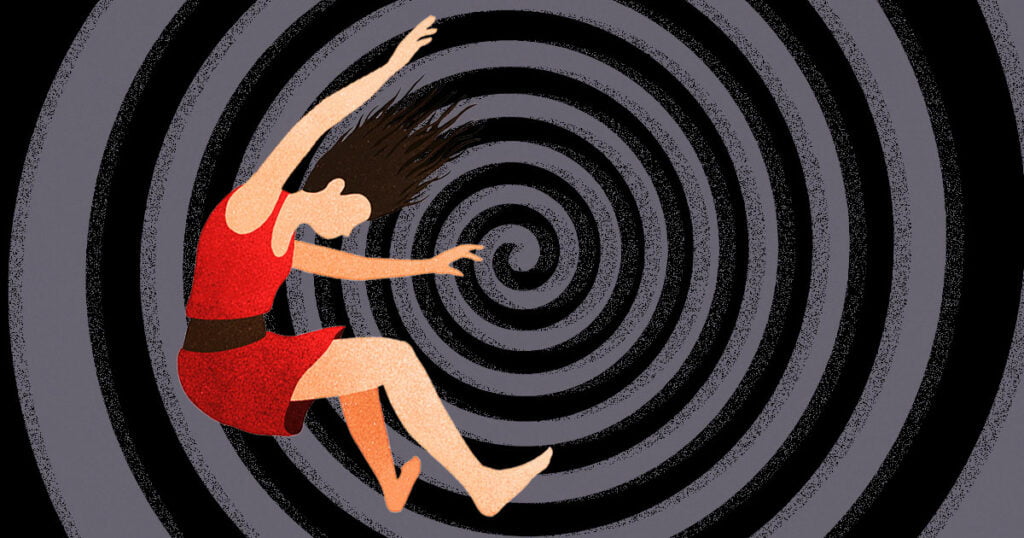Do you ever feel like you can’t turn your brain off? That nagging feeling that won’t go away no matter how much you try to ignore it? If so, you may be experiencing ruminating anxiety. Ruminating anxiety is a type of anxiety that refers to the act of constantly thinking about negative things. This can include worrying about the future, obsessing over past mistakes, or fixating on negative thoughts and images. If left untreated, ruminating anxiety can lead to depression and other mental health issues. In this blog post, we will discuss what ruminating anxiety is, as well as strategies for overcoming it.
Contents
What Is Ruminating Anxiety?

Anxiety is a normal emotion that we all experience at times. It’s what we feel when we’re worried, nervous, or scared about something. For some people, anxiety can be short-lived and mild. But for others, it can be chronic and debilitating.
Ruminating anxiety is a type of anxiety that involves repetitive and negative thinking about one’s worries and concerns. This can lead to a feeling of being stuck in a never-ending cycle of worry and dread. If you’re struggling with ruminating anxiety, you may feel like you can’t escape your thoughts or shake the feeling of fear and unease.
Fortunately, there are things you can do to break out of the cycle of ruminating anxiety. With some effort and perseverance, you can learn to control your thoughts and manage your anxiety. Sometimes, professional help may also be necessary to address underlying issues that are contributing to your anxiety.
What Are The Symptoms of Ruminating Anxiety?

The symptoms of ruminating anxiety can vary from person to person. Some people may only experience mild symptoms, while others may find their symptoms to be more severe. The following are some common symptoms of ruminating anxiety:
Repetitive and Negative Thinking About One’s Worries and Concerns
One of the common signs of ruminating anxiety is repetitive and negative thinking about worries and concerns. This can lead to a feeling of being stuck in a never-ending cycle of worry and dread. Also, because ruminating thoughts are usually based on worst-case scenarios, they can often be unrealistic and irrational.
Avoidance of Certain Situations or Activities
Another common symptom of ruminating anxiety is avoidance of certain situations or activities that trigger anxiety. For example, someone with social anxiety may avoid attending parties or going out in public. Or, someone with agoraphobia may avoid leaving their home. While avoidance can provide temporary relief from anxiety, it can also lead to further isolation and feelings of hopelessness.
Intrusive Thoughts
Intrusive thoughts are another symptom of ruminating anxiety. These are unwanted and often disturbing Thoughts that repeatedly enter a person’s mind. Intrusive thoughts can be about anything, but they’re often about things that we’re afraid of. For example, someone with OCD may have intrusive thoughts about germs and contamination. Or, someone with anxiety may have intrusive thoughts about being in danger or harm’s way.
Sleep Problems
Anxiety can also cause sleep problems. People with ruminating anxiety may have difficulty falling asleep or staying asleep. They may also experience nightmares or night terrors. Sleep problems can lead to fatigue and further difficulties in concentration and focus. These problems can make it even harder to manage anxiety.
Changes in Appetite
Changes in appetite are another common symptom of ruminating anxiety. People may find that they’re either eating more or less than usual when they’re feeling anxious. This can lead to weight gain or weight loss.
Restlessness and Irritability
Restlessness and irritability are also common symptoms of ruminating anxiety. When people are feeling anxious, they may have a hard time sitting still or relaxing. They may also be easily annoyed or angered by other people or things.
Physical Symptoms
Physical symptoms are another common symptom of ruminating anxiety. These can include muscle tension, headaches, stomachaches, and dizziness. Physical symptoms can often be the result of stress and worry. These physical signs also tend to make anxiety worse.
These are some of the signs of ruminating anxiety. If you’re struggling with anxiety, it’s important to understand your symptoms and how they’re affecting you. Only then can you begin to work on managing and controlling your anxiety.
What Causes Ruminating Anxiety?

Many different factors can contribute to ruminating anxiety. For some people, anxiety may be caused by a specific event or situation. For others, there may be no clear trigger for their anxiety. The following are some of the possible causes of ruminating anxiety:
A Traumatic Event
One of the possible causes of ruminating anxiety is a traumatic event. This can include anything from an accident to a natural disaster. Experiencing a traumatic event can be very stressful and can lead to feelings of anxiety. This cause of anxiety can be especially problematic if the event is replayed over and over again in a person’s mind.
Genetic Factors
Another possible cause of ruminating anxiety is genetic factors. This means that anxiety may be passed down from family members. If you have a family member with anxiety, you may be more likely to experience anxiety yourself. Sometimes, anxiety may be caused by a combination of genetic and environmental factors.
Brain Chemistry
Brain chemistry is another possible cause of ruminating anxiety. This refers to the way chemicals in the brain interact with each other. An imbalance in brain chemistry can lead to mental health conditions like anxiety. Brain chemistry makes people more vulnerable to anxiety, but it doesn’t necessarily cause it.
Stressful Life Experiences
Stressful life experiences can also contribute to ruminating anxiety. These experiences can include things like job loss, divorce, or the death of a loved one. Any type of major life change can be stressful and can lead to anxiety.
Some of these stressful life experiences are beyond our control. However, there are things we can do to manage the stress in our lives. This can help to reduce the symptoms of ruminating anxiety.
What Are The Treatment Options for Ruminating Anxiety?

If you’re struggling with ruminating anxiety, there are treatment options available to you. The following are some of the most common treatment options:
Psychotherapy
One of the most common treatment options for ruminating anxiety is psychotherapy. This type of therapy can help you to understand your anxiety and how to manage it. Cognitive-behavioral therapy (CBT) is a type of psychotherapy that is often used to treat anxiety. CBT can help you to change the way you think about and react to anxiety-inducing situations.
Another therapy is exposure therapy. This type of therapy can help you to face your fears and learn to control your anxiety. In exposure therapy, you would be exposed to the things that trigger your anxiety in a safe and controlled environment. This can help you to manage your anxiety and eventually overcome it.
Medication
Another treatment option for ruminating anxiety is medication. There are many different types of medications that can be used to treat anxiety. The most common type of medication is an anti-anxiety medication. These medications can help to reduce the symptoms of anxiety.
Some people may also be prescribed antidepressants. Antidepressants can also help to reduce the symptoms of anxiety. However, they can take several weeks to start working. Other medications that may be used to treat anxiety are beta-blockers. Beta-blockers can help to reduce the physical symptoms of anxiety, such as a racing heart.
Lifestyle Changes
In addition to medication and therapy, making lifestyle changes can also help to reduce the symptoms of ruminating anxiety. The following are some lifestyle changes that may help:
Exercise: Exercise can help to release endorphins, which can improve your mood. It can also help to reduce stress and promote relaxation.
Healthy diet: Eating a healthy diet can help to improve your overall health. This can in turn help to reduce the symptoms of anxiety.
Reduce alcohol and caffeine consumption: Alcohol and caffeine can make anxiety worse. So, reducing your consumption of these substances can help to improve your anxiety symptoms.
Get enough sleep: Getting enough sleep is important for overall health. It can also help to reduce the symptoms of anxiety.
Manage stress: Stress can make anxiety worse. So, it’s important to find ways to manage stress in your life. This can include things like yoga, meditation, and deep breathing exercises.
Journaling: Writing in a journal can help to identify the things that trigger your anxiety. It can also help you to track your progress as you work on managing your anxiety.
Conclusion
Ruminating anxiety is a type of anxiety that is characterized by repetitive and negative thinking. It can be caused by a variety of factors, including brain chemistry and stressful life experiences. There are many treatment options available for ruminating anxiety, including psychotherapy, medication, and lifestyle changes. If you’re struggling with this type of anxiety, there is help available to you.
For more information on anxiety and its treatments, please see visit us.
Hope this article was of help to you! If you are suffering from mental health disorders, you may seek help from Therapy Mantra. We have a team of highly trained and experienced therapists who can provide you with the tools and skills necessary for overcoming mental health disorders. Contact us today to schedule an online therapy or download our free Android or iOS app for more information.


